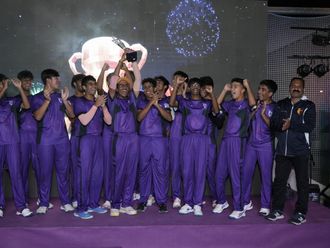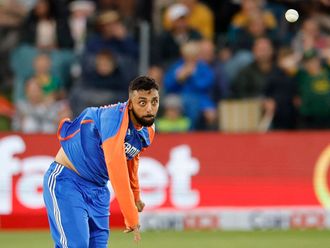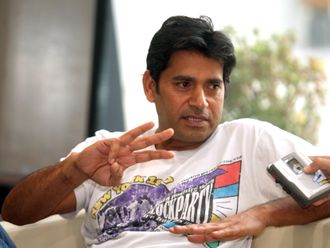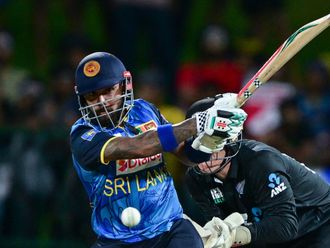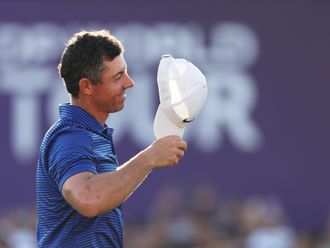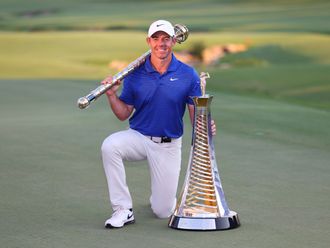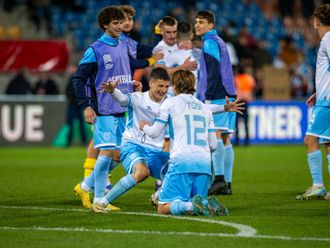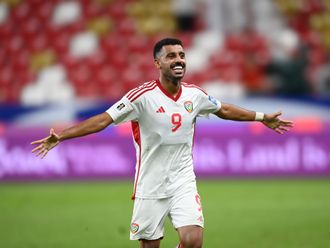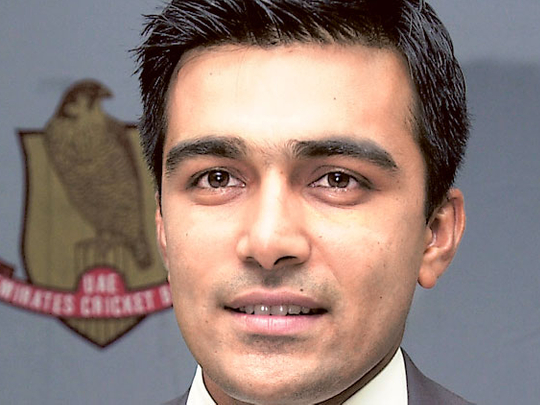
Dubai: Khurram Khan, the UAE cricket captain, will embark on a significant mission to the Netherlands on July 12. Victories in the ICC World Cricket League Championship on July 21 and 23 against the Netherlands in Rotterdam will strengthen the UAE’s dream of playing in the 2015 World Cup in Australia and New Zealand.
Khan, 41, is a veteran of many battles and has led UAE to victories over Kenya, Afghanistan (twice) and Scotland in the league to share top place with Ireland. He balances his career at Emirates airline with cricket.
In an exclusive interview with Gulf News, Khan spoke about the challenges he faces as the national team captain, his dreams and the future of the game in UAE.
What is the mood in the UAE camp ahead of your trip to the Netherlands, with the team having strengthened their chances of qualification for the 2015 World Cup?
We have been practising very hard for nearly two months under the new coach Aaqib Javed. For nearly one month and a half we were training at the ICC grounds, taking part in a conditioning camp, focusing on practice and fitness.
Now we are training at the Sharjah Cricket Stadium. The boys are working really hard and some of them shed eight to ten kilos during the tough conditioning camp.
Did they shed weight due to the training regime in the extreme heat or as part of a fitness drive?
Ever since Javed became our coach, the emphasis has been on getting fitter. The heat has been a challenge, but the determination to keep fit has been even greater. Javed strongly believes that we all have good talent, but what we need most of all is fitness.
From your experience as captain, what is the biggest challenge that the UAE face in international cricket?
The biggest challenge on tour to countries like the Netherlands is adapting to the wickets and conditions there. Since the wickets here are very dry and easy to bat on, for our players to play in the Netherlands where we have never played, it could be a totally different experience.
According to ICC match reports on matches played in Netherlands, the conditions are tough as the ball seams a lot. This is the challenge we always face here as the wickets are never like in those countries.
However, this time we have worked very hard to counter this problem. Our coach has asked the groundsman to prepare different types of wickets every day to get used to playing on different surfaces.
Does that mean the team could play on different kinds of wickets during the practice sessions to help adaptability?
Yes. We created two or three wickets in Sharjah. One was with lots of grass and, another was created by putting more moisture to get used to seaming conditions. At the ICC Global Academy grounds, too, we experienced different kinds of wickets.
Why have the UAE in recent years come so close to qualifying for World Cup and then failed in their quest? What do you pinpoint as the reason for stumbling near the end?
Most of the countries like Ireland, Holland, Scotland and Afghanistan who have qualified for World Cup events for the last three years are made up of players who play the game full-time.
Our team is made up of part-time cricketers. We can come for practice only after finishing our office work.
Right now, Holland are playing in England. Similarly for Ireland and Scotland, at least six or seven of their players are playing in English county cricket, which is really tough and competitive.
When they play such cricket, they improve their game, whereas we don’t get the same exposure. We don’t even get to play the A teams from India, Pakistan or Sri Lanka.
We have to improve by playing club cricket. When we play competitive cricket and reach the final rounds against Ireland and Scotland, we find it difficult. So we need to prepare like those teams.
What have you learned from close defeats and how do you plan not to repeat such near-misses?
So many times it has happened to us and it has always been very heart-breaking. You feel so sad when we lose by slender margins after having worked so hard.
The only way out of it is to keep doing the basics right and keep on working hard and with self-belief. I am sure it is just a matter of time before results begin to come.
We have a very good talented side now, and I am happy to see many new faces coming in. I strongly believe that we have a very good chance to make it to the World Cup.
Do you think that the standard of domestic cricket here too should improve so that the level competition also improves dramatically?
Definitely. Unless you raise standards locally with better matches, we do not stand a chance of competing with top teams.
The majority of the tournaments here are Twenty20 events, and there are only three or four 50-over tournaments.
In the Netherlands, we will first be playing in the ICC Intercontinental Cup, which is a four-day match. Coming from Twenty20 cricket, it is very hard to switch right away to four-day mode.
How do you balance your job with cricket despite flying for many days as part of your job?
Whenever I fly anywhere, I make sure to carry my tracksuit and jogging shoes with me. As soon as I reach the hotel, I go swimming or running in the hotel to keep fit. I know that once you stop keeping fit, it is very hard to catch up.
Your are into your 40s, but still you are a consistent performer. What is your secret?
It is very straightforward. I do my fitness training whenever I get a chance, even if I am not in Dubai. Given my age, I don’t see myself playing for a long time, and would like to see more youngsters coming along and somebody else take over as captain.
Are there any dreams you want to realise before you hang up your boots?
My biggest dream is to help UAE qualify for the 2015 World Cup, although to be honest, I don’t see myself playing in it. We are in a very good position now. It would be a great achievement if I can help UAE qualify for it.
How satisfied are you with your career as a cricketer when you look back on your days in Pakistan and the UAE?
I am from Multan and everybody in my family played the game, especially my brother Atiq Khan, who was a first-class cricketer. Even my father motivated me a lot.
I am very delighted to have come to UAE and go on to play international cricket, which I could not do even in my own country. Everyone here has backed me to give my best, including the selectors, who put a lot of confidence in me.
To what extent have your employers also helped you in balancing your career with cricket?
I cannot find the words to thank Emirates airline. It has done a lot to help me sustain my passion for cricket, especially our chairman Maurice Flanagan and our former team manager Leroy Lindsay.
It not easy for a company to release its employees to play cricket, but that is what is needed from all companies. Emirates airline has supported me throughout, and I am where I am now due to them.


